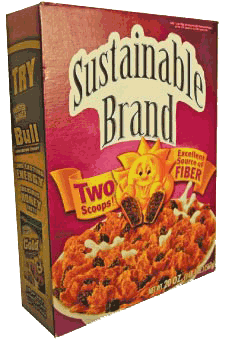A sustainable agriculture label: coming to foods near you?
by Joel Preston Smith
This article was originally published in September 2008

(September 2008) — Sustainable agriculture — imagine it not as a concept but as a brand, a marketing ploy stamped on virtually anything that can be harvested, packaged or promoted.
There’s little agreement on what constitutes “sustainable” in agriculture (or any other industry) but that won’t stop the phrase from appearing soon on a food label near you.
Scientific Certification Systems (SCS) of Emeryville, Calif., is pushing for the adoption of a sustainable agriculture label as a U.S. standard for food and other products. In April 2007, SCS offered start-up funds for what some call a “super label” to a nonprofit (the Leonardo Academy) that develops industrial and environmental standards.
Some farmers, producers, certifiers and consumer advocacy groups fear this proposed label will confuse U.S. consumers as they drift through supermarkets, bombarded by products that claim to be “eco-friendly.”
No one seems to question the wisdom of creating a “green” food industry. But many do question how something that hasn’t been defined can be “certified.” They also wonder who’s behind the push to create the new certification, and who stands to gain the most?
Some of the concern centers on SCS itself. The company purports to be the first U.S. corporation to test and certify “eco-friendly” products. SCS launched its Nutriclean certification process in 1987, offering producers and marketers a seal of approval for products that were tested for pesticide residues and met certain limits.
The Nutriclean certification wasn’t false. It was “misleading,” however, according to Consumer Reports. The eco-label division of Consumers Union explains that the Nutriclean seal “is not equivalent to ‘free of pesticide residue,’” since there still can be residues below the threshold set by Nutriclean.
As currently proposed, compliance with the proposed “sustainable agriculture” label would be voluntary, inviting producers and merchandisers to purchase the right to certify that a product is “sustainable” while requiring no verification that the product merits the designation. This is particularly disturbing to those who fought to establish a mandatory standard for organics (with statutory weight), governed by the U.S. Department of Agriculture (USDA) National Organic Program.
It should come as no surprise that those working to shape the new label include the Monsanto Company, Syngenta Crop Protection, CropLife America, the Cotton Council and various other representatives from the biotech industry and non-organic agriculture — none of whom are rationally associated with the term “sustainable.”
Natalie Reitman-White, sustainability coordinator for the Organically Grown Company, notes that many organic farmers and producers might support a label designating products that are “sustainably produced” — a label that takes into account fair labor standards and farm workers’ health. But they worry that their participation in the current process will undermine the gains made by the organic movement.
“The fear of the new label,” says Reitman-White, “is that it could roll back all the success that we’ve achieved, if it allows practices prohibited by the National Organic Program.”
Organic, however, isn’t an all-encompassing label. When the USDA authorized the organic seal for use on food products in October 2002, the broader goal of creating a sustainable food system wasn’t addressed completely.
The organic label doesn’t guarantee (yet) that farm workers will be paid a living wage or that the product will be processed, packaged and shipped in an environmentally responsible fashion.
The most pervasive concern about the “sustainable agriculture” standard or label is that it will destroy the very idea of organic — that it seems all-encompassing but in truth is so nebulous that consumers will no longer be able to sort truth from fiction.
Linda Brown, co-founder and executive vice-president of Scientific Certification Systems, says she believes the sustainable label would create more pressure for a truly sustainable society.
“I’m concerned that if we don’t have a sustainable agriculture standard,” Brown says, “genetically modified organisms (GMOs) are going to get shoved down our throats.”
Brown argues that a sustainable agriculture standard and label offers stakeholders a chance formally and conclusively to reject GMOs, pesticides and other eco-outcasts. She concedes that food processors would not have to be certified in order to use the label.
Wouldn’t the lack of oversight, of validation, tempt some companies to abuse the label?
“Theoretically I don’t think that will happen, but it is possible,” Brown admits.
The Leonardo Academy already has selected 58 members for a committee tasked with drafting the “sustainable agriculture” label. As some feared, representatives of corporate conglomerates such as Kellogg, Dole Fresh Fruit, and General Mills are among the members.
Yet there’s diversity at the table, too, with Defenders of Wildlife, Oxfam America, and the Coalition of Immokalee Workers. An academy official believes the new standard could be approved for use by 2010.
Joel Preston Smith is the author of “Night of a Thousand Stars and Other Portraits of Iraq.” A longer version of this article originally appeared in the August issue of In Good Tilth magazine.
